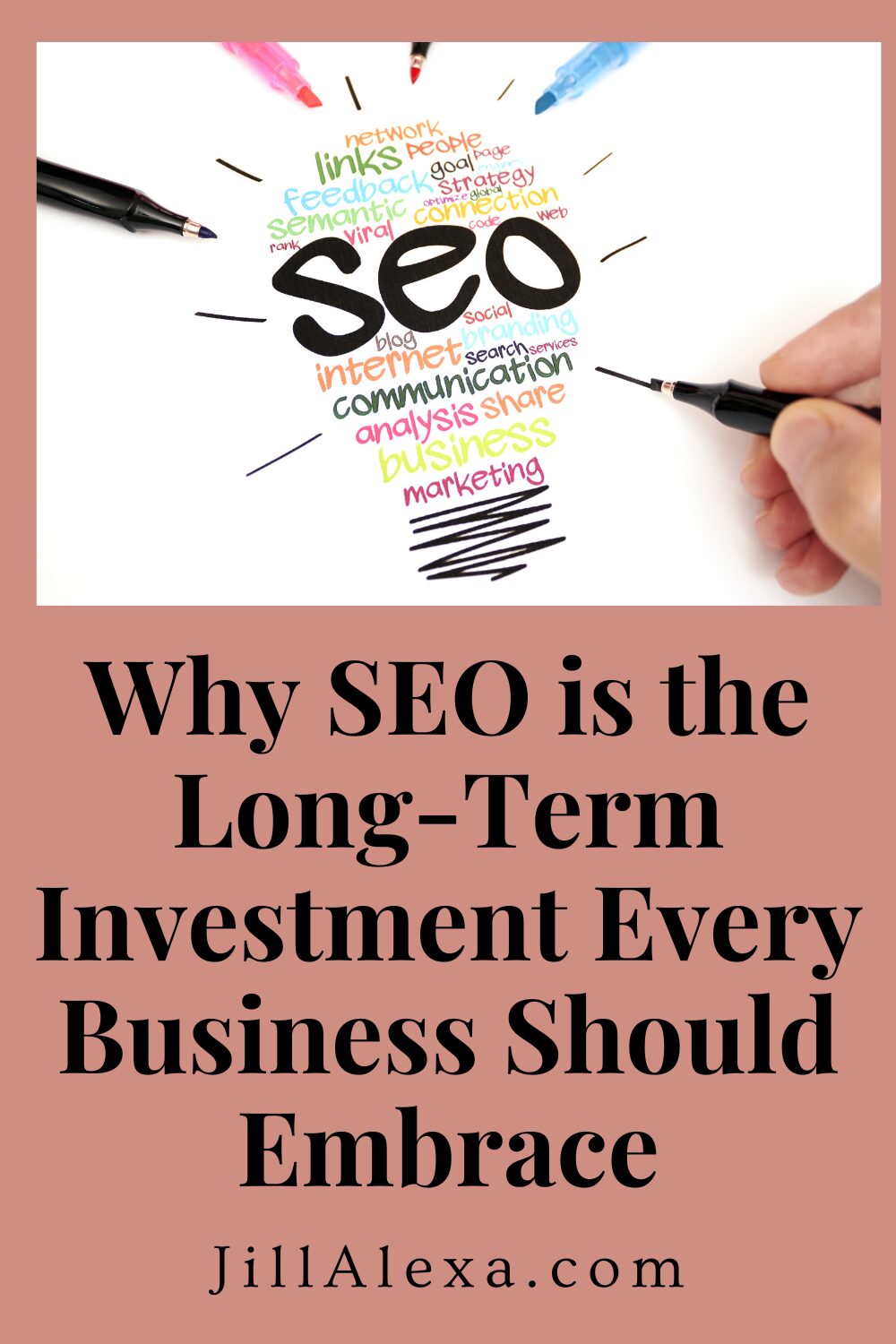SEO | JillAlexa.com
When starting a business from scratch, you mostly think about the product, service, and website first.
All of the other things, such as marketing, tend to come a bit later. But when it’s time to do some marketing, for the most part, you need to keep in mind that it’s not always quick and snappy.
You can’t just expect to post something online and then it go viral. It just doesn’t work like that. But one thing you can always count on to be sustainable, especially for long-term growth, is SEO.
Why SEO is the Long-Term Investment Every Business Should Embrace
In the digital age, establishing a robust online presence is paramount for the success of any business. You know that it’s one of the very basics for business survival. Search Engine Optimisation, as it’s also called, is a cornerstone of online visibility, providing a long-term investment that pays dividends over time.
Sure, it’s totally understandable if you don’t want to think too much about the future since you need to get your business just off the ground first. But it’s going to help to focus on this as well as other forms of marketing from the beginning.
It’s important you keep that in mind; while sure, it’s always going to help to get fast results and fast notice for your brand, this really shouldn’t be the only thing to consider either. They say that slow and steady wins the race, and when it comes to SEO, there’s so much truth to it!
So, with that said, here’s why SEO is not just a one-time effort but a strategic, ongoing investment that every business should embrace.
SEO: 8 Major Reasons Every Business Should Invest in Search Engine Optimisation
1. It’s All About Building a Strong Foundation
What you need to keep in mind is that SEO is like laying the foundation of a sturdy building. It’s a comprehensive approach that involves optimising various aspects of your online presence, from website structure and content to user experience and back-end technicalities. Is it a lot of work? Honestly, yes, it is.
There are a lot of ropes to it: you have technical SEO for your website (like the coding itself), learning how to do blogger outreach and the importance of that, the social media aspect, your images, and the list can continue. It’s a lot of work, but when it comes to building a foundation, you can see that as a lot of work, too. So, just building this solid foundation takes time but sets the stage for long-term success.
2. Sustainable Organic Traffic Growth
One of the primary objectives of SEO is to improve organic search rankings. That’s basically the main goal of it all. Unlike paid advertising, which delivers immediate results but stops when the budget runs out, organic traffic generated through SEO continues to grow over time.
Sure, you’ll need to update pages here and there, but it’s usually just a few tweaks at most. So, by consistently optimizing your website, you create a sustainable source of organic traffic that can endure for years. Patience is key; that’s what you need to keep in mind.
3. It’s All About Earning Credibility
Something else you really need to think about is the fact that trust is a crucial currency in the online world. It’s basically getting more and more challenging to figure out what business is a scam and what’s not. Scam businesses don’t focus on SEO; they usually create a website and an Instagram account, and that’s usually it. SEO helps businesses establish trust and credibility with their audience.
So, just by consistently appearing at the top of search results signals to users that your business is authoritative and relevant. Over time, this trust translates into a loyal customer base and positive brand associations.
4. Adapting to Industry Changes
You really need to keep in mind that the digital landscape is dynamic, with search engine algorithms evolving regularly. Basically, trends are constantly changing. Think of social media for a second; there is something constantly happening that marketers need to cater to there.
SEO is not a set-it-and-forget-it strategy; it requires ongoing adaptation to stay in sync with industry changes and search engine updates. Businesses that invest in continuous SEO efforts are better equipped to navigate algorithmic shifts and maintain their online visibility. But at the end of the day, it’s far easier for SEO to adapt to industry changes; there’s not as much work as there is with social media.
 5. Ideal for Local and Global Reach
5. Ideal for Local and Global Reach
As you probably already know, SEO is a versatile tool that allows businesses to target both local and global audiences. Technically, most forms of marketing do this, but it still helps if it’s SEO, which is usually considered easier too. Local SEO strategies help businesses connect with nearby customers, while a well-optimized website can attract a global audience. This dual approach broadens the reach of your business and opens doors to new markets over time.
6. You’ll Have a Competitive Edge
If you think about it, if you invest in SEO gain, you’re going to have a valuable advantage over competitors who neglect this critical aspect of online marketing. There are plenty of businesses that don’t bother or just flat-out don’t care about SEO. So if you go ahead and do this now, you’re vastly far ahead than they’ll be.
Plus, you need to think of newer competitors, too, and the fact they won’t be established on search engines either (so an advantage to you). So, a strong SEO strategy positions your business as a leader in your industry, attracting more customers and staying ahead of the competition.
7. It’s Pretty Budget-Friendly
While paid advertising can deliver quick results, it often comes with a hefty price tag. The same can even be said with paying for social media ads; those are expensive, too, and there’s no guarantee it’d work out. SEO, on the other hand, is a cost-effective strategy that yields lasting benefits. Once your website establishes a strong organic presence, the ongoing maintenance costs are comparatively lower than continuous spending on paid advertising campaigns. Plus, when it comes to SEO services, those are fairly inexpensive, too.
8. Pushes You to Think More About UX
One thing you should keep in mind is that search engines prioritise websites that offer a positive user experience. SEO involves optimising not only for search engines but also for the end user. So, just by focusing on factors such as page speed, mobile responsiveness, and quality content, SEO enhances the overall user experience.
While sure, a lot of businesses know and understand the sheer importance, sometimes this gets put on the back burner. So, SEO and UX go beautifully together and should be kept in mind. You can see it as a push. This not only improves search rankings but also contributes to customer satisfaction and retention.
Is SEO Really Worth it in the End?
SEO is not just a digital marketing tactic; it’s a long-term investment that can significantly impact the success and sustainability of your business. You can’t expect to get results tomorrow; it takes months, but really, this can actually be seen as a good thing though! From organic traffic growth and enhanced credibility to cost-effectiveness and adaptability, the benefits of SEO extend far beyond immediate results.
Slow and steady truly does win the race, and it’s going to be exactly why you can count on getting the benefits you’ve always been after! As you embark on your online journey, view SEO as an ongoing commitment—one that builds the foundation for lasting visibility, credibility, and success in the digital landscape.

